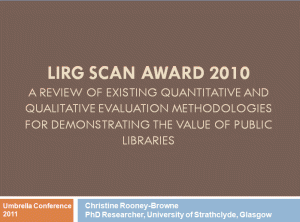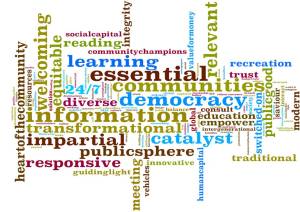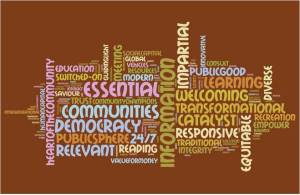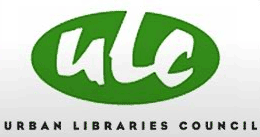I’ve just finished reading a seriously interesting and thought-provoking report; From Awareness to Funding: A study of library support in America and recommend it to anyone interested in understanding more about public library funding and/or marketing.
Funded by a grant from the Bill and Miranda Gates Foundation, the OCLC hooked up with research and marketing agency, Leo Burnett, to:
- investigate current attitudes and perceptions of public libraries; determine how best to challenge traditional misconceptions.
- identify whether implementation of targeted national marketing and advocacy campaigns would lead to an increase in public library funding.
Although the results are based on an American sample, the message is relevant to anyone working in public libraries today.
It highlights that public libraries undertake marketing and promotional campaigns to help increase footfall, drive usage, etc…but is this backed up with additional funding from the parent organisation to enable them to cope with, for example, an increase in new users or enhanced expectations? Probably not. This report attempts to develop a strategy, not only for increasing visitor numbers and challenging perceptions, but also for ensuring that our libraries are adequately funded and suitably equipped to respond to the needs of 21st century stakeholders.

Public libraries are more than just book issuing points (Photos © East Renfrewshire Council)
It also provides ‘food for thought’ for those of us interested in communicating the value of public libraries to those ‘holding the purse strings’:
“Library funding supporters are not swayed by messages that detail library services delivered, but rather by messages that remind them of the library’s impact on their community”
(OCLC, 2008, 7:4)
Also interesting are the three key themes that the focus groups developed to enable public libraries to attract funding that is on a par with other public services:
1. Make the library relevant for the 21st century
2. Instil a sense of urgency by putting the library in a competitive context for funding, alongside public schools, fire department and police department
3. Activate conversations about the library’s importance in community infrastructure and its role in the community’s future (OCLC, 2008, 7:5)
I won’t go into too much depth about the report as you can check it out for yourself here, and I’d recommend that you do, if you’re interested in the future of public libraries. In the UK we’re constantly bombarded with reports about the ‘credit crunch’ and predictions of a recession in the coming months; so the reality is that we might all have to re-evaluate how we secure funding for our public libraries…as there’s sure to be even more cutbacks on the way and we don’t want to be viewed as a ‘non-critical’ public service when the government attempts to slash the public sector budgets again!
Thanks to Alan Poulter for forwarding on the OCLC report.
Read Full Post »
 On Tuesday I attended the annual CILIP Umbrella conference for the first time. I had been invited by LIRG to present the findings of my literature review on methodologies for measuring the value of public libraries. Here’s a link to my presentation and a link to the final paper; and a selection of links to interesting library valuation studies that I’ve published on Voices for the Library.
On Tuesday I attended the annual CILIP Umbrella conference for the first time. I had been invited by LIRG to present the findings of my literature review on methodologies for measuring the value of public libraries. Here’s a link to my presentation and a link to the final paper; and a selection of links to interesting library valuation studies that I’ve published on Voices for the Library.


 carbon dioxide as boiling your kettle for a cup of tea.
carbon dioxide as boiling your kettle for a cup of tea. 


